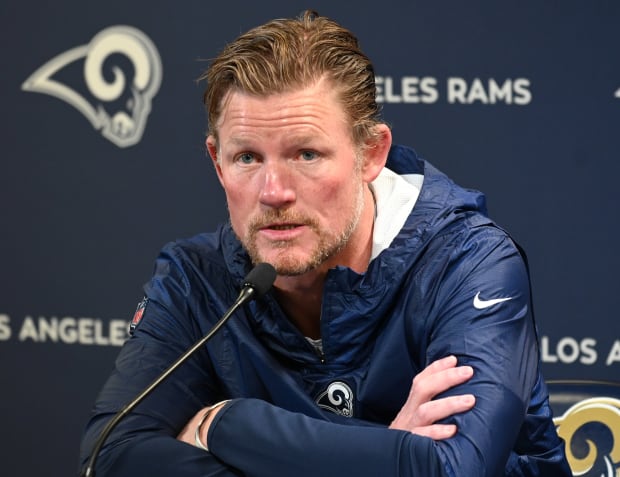In acquiring Matthew Stafford, Rams general manager Les Snead continued his quest to acquire as many stars as possible with little regard for depth or the future.
Here’s how you can tell the Rams’ roster building strategy has crossed the line from entertaining and cheekily reckless to
Wall Street Bets subreddit levels of incomprehensible fearlessness: moments after Los Angeles swung a deal with the Detroit Lions for Matthew Stafford on Saturday night, which cost them Jared Goff, their third-round pick this year and their first-round picks for the following two seasons (they don’t have one this year), the immediate reaction was not a fever-dream vision of Stafford finally realizing his potential in an offense that can accentuate his all-field ball control and cannon arm. Instead, what surfaced was a genuinely concerned look at the infomercial-level reverse mortgaging the franchise has done to get themselves here.Under general manager Les Snead, the Rams picked in the first round of the 2016 draft and will not do so again until primary season of our next presidential election. They spent picks to acquire Marcus Peters (now a Raven), Dante Fowler (now a Falcon), Brandin Cooks (now a Texan) and Sammy Watkins (now a Chief). Including what took place on Saturday, Snead has dealt 21 picks (seven first-round picks, four second-round picks, four third-round picks, two fourth-round picks, three fifth-round picks and two sixth-round picks) and four players from that flurry—Stafford, Kenny Young, Austin Corbett and Jalen Ramsey—remain.

The common refrain is that if the Rams win the Super Bowl in 2021 none of it will matter. That was the rationalization for Snead’s maxing of the credit cards back in 2018 during their Super Bowl run. Landing a quarterback who, still in his athletic prime, has a chance to throttle NFL defenses in 2021, may earn him a second pass as well as more comparisons to Bill Belichick in New England and John Schneider in Seattle, other NFL general managers who poo-poo the relative importance of first-round picks in favor of acquiring developed talent to speed the timeline (or flipping the first-rounders into more overall selections within the value range of the top 100). This thought ignores the fact that it was Goff’s horrendous contract, which the Rams signed him to despite sketchy evidence that he could be a long-term franchise starter in the first place, was probably why the Lions had requested so much draft capital in return for Stafford. Los Angeles was paying to clear what they could off the books. Detroit needed motivation to eat that kind of cap hit and yearly commitment.
The Weak-Side Podcast now has its own feed! Subscribe to listen to Conor Orr and Jenny every week.
The grandeur of this blockbuster deal aside, it is really no different than any other chips-to-the-center maneuver from an embattled general manager circling a desperate place—one of the strange quirks of an NFL power structure that allows for unchecked aggression that will undoubtedly penalize the club years after the decision maker is gone. Some, like Jason Licht in Tampa Bay, will encourage the idea. Others, like former Giants general manager Jerry Reese, are a cautionary tale on how far a franchise gets set back through the aggressive flailing of a personnel head looking to right previous wrongs by hurling more cash at the problem.
If you are the Rams’ owner, the fear should be how this move will harm your greatest asset: Sean McVay. Even if it makes him happy now (he is, reportedly, quite excited about this deal and could very well have been the driving force behind it given how non-committal he was to Goff at the end of the season). McVay is still the youngest head coach in the NFL. He’s extraordinarily talented and could be a centerpiece of the franchise long after Stafford’s playing days are over. The Rams’ best chance at success over the long-term is providing him with the kind of sustainable talent that can evolve alongside his maddening offense. In 2021, McVay might very well have that luxury immediately; a tight window of competitiveness that allows for zero margin of error and no significant injuries. And, again, one could argue with some merit that this Rams team was good enough to beat some of the best teams in football this year and win 11 games despite its offense swinging with one hand tied behind its back, so that with a more dependable option at quarterback they are destined for a deep postseason run next year.
The flip side is that even a great head coach will eventually wither under the reality of Los Angeles’s troubled finances. Without the ability to usher in affordable, premium talent on rookie contracts—a pillar of the non-Seattle/New England modern roster building playbook—a coach is only going to be as good as the team he can afford to build.
Then again, the Rams have been so good at living in the moment, maybe they’re about to teach us a valuable lesson about the cost and benefit of the credit card bills once they come due. Here’s hoping for everyone’s sake it’s an epic ride worth the while.

0 Comments:
Post a Comment